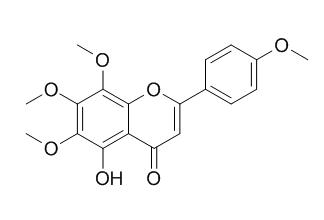Gardenin B
Gardenin B exhibits superior antiproliferative activity against lung, breast, colon, hepatic and leukaemia cell lines as well as in keratinocytes .Gardenin B-induced cell death in human leukemia cells involves multiple caspases but is independent of the generation of reactive oxygen species. Gardenin B can strongly inhibit biochemical production of nitric oxide (IC50=10.59±0.4 ug/mL).
Inquire / Order:
manager@chemfaces.com
Technical Inquiries:
service@chemfaces.com
Tel:
+86-27-84237783
Fax:
+86-27-84254680
Address:
1 Building, No. 83, CheCheng Rd., Wuhan Economic and Technological Development Zone, Wuhan, Hubei 430056, PRC
Providing storage is as stated on the product vial and the vial is kept tightly sealed, the product can be stored for up to
24 months(2-8C).
Wherever possible, you should prepare and use solutions on the same day. However, if you need to make up stock solutions in advance, we recommend that you store the solution as aliquots in tightly sealed vials at -20C. Generally, these will be useable for up to two weeks. Before use, and prior to opening the vial we recommend that you allow your product to equilibrate to room temperature for at least 1 hour.
Need more advice on solubility, usage and handling? Please email to: service@chemfaces.com
The packaging of the product may have turned upside down during transportation, resulting in the natural compounds adhering to the neck or cap of the vial. take the vial out of its packaging and gently shake to let the compounds fall to the bottom of the vial. for liquid products, centrifuge at 200-500 RPM to gather the liquid at the bottom of the vial. try to avoid loss or contamination during handling.
Front Plant Sci.2020, 11:630.
Korean J Acupunct2020, 37:104-121
Phytomedicine.2021, 2(82):153452
Arch Biochem Biophys.2020, 687:108363.
Journal of functional foods2018, 171-182
Front Aging Neurosci.2019, 11:230
Int J Mol Sci.2019, 21(1):E265
Oxid Med Cell Longev2020, 12
Front Microbiol.2022, 13:835463.
Nutrients.2021, 13(1):254.
Related and Featured Products
Chem Biol Interact. 2016 Aug 25;256:220-7.
Gardenin B-induced cell death in human leukemia cells involves multiple caspases but is independent of the generation of reactive oxygen species.[Pubmed:
27423764 ]
Flavonoids have attracted great interest due to their possible anticancer activities.
METHODS AND RESULTS:
Here we investigated the antiproliferative activity of the flavonoids isolated from Baccharis scandens against human leukemia cell lines and found that the methoxyflavonoid Gardenin B was the most cytotoxic compound against HL-60 and U-937 cells, showing IC50 values between 1.6 and 3.0 μM, but had no significant cytotoxic effects against quiescent or proliferating human peripheral blood mononuclear cells. These effects on viability were accompanied by the concentration- and time-dependent appearance of apoptosis as evidenced by DNA fragmentation, formation of apoptotic bodies and a sub-G1 ratio increase. Comparative studies with the best-studied bioflavonoid quercetin indicate that Gardenin B is a more cytotoxic and more apoptotic inducer than quercetin. Cell death induced by Gardenin B was associated with: (i) a significant induction of caspase-2, -3, -8 and -9 activities; (ii) cleavage of the initiator caspases (caspase-2, -8 and -9), of the executioner caspase-3, and of poly(ADP-ribose) polymerase; and (iii) a concentration-dependent reactive oxygen species generation.
CONCLUSIONS:
In conclusion, apoptosis induced by Gardenin B is associated with activation of both the extrinsic and the intrinsic apoptotic pathways of cell death and occurs through a mechanism that is independent of the generation of reactive oxygen species.
Biomed Pharmacother. 2017 Jan;85:444-456.
Characterization of bioactive constituents from the gum resin of Gardenia lucida and its pharmacological potential.[Pubmed:
27899258 ]
METHODS AND RESULTS:
In the present study we mined the information on Gardenia lucida (Dikamali) and identified seven polymethoxyflavones from its gum resin. We also investigated its antiproliferative and antioxidant potential. Xanthomicrol (8) found as potent DPPH scavenger (85.86±1.3%) along with strong ferric plummeting ability (53.60±2.0 FSE) and reducing potential (1.07±0.01) as compared to ascorbic acid. Gardenin B (5) strongly inhibit biochemical production of nitric oxide (IC50 10.59±0.4μg/mL) followed by 5-Desmethylnobiletin (7) and Gardenin E (10, IC5011.01±0.7-34.53±2.7μg/mL). Methanol extract, chloroform fraction and Acerosin (11), Gardenin D (9) and Gardenin B (5) exhibited superior antiproliferative activity against lung, breast, colon, hepatic and leukaemia cell lines as well as in keratinocytes (IC50 12.82±0.67-94.63±1.27μg/mL) whereas other fractions and isolated compounds moderately affect the cell proliferation (21.40±0.12-48.12±0.47%) with least and non-specific interaction against succinate dehydrogenase. Except compound 2, 3, 6, 8 and 11, others were found as a significant inhibitor of ODC (IC50 2.36±0.7-8.53±0.32μg/mL) with respect to DFMO (IC50 10.85±0.28μg/mL). In silico analysis also revealed enervated binding energy (-4.30 to -5.02kcal/mol) and inhibition constant (704.18-210.26μM) wherein 5, 7, 8, 9 and 10 showed specific interaction with the receptor while rest were non-specific. Except butanol fraction and Gardenin E, others were potently inhibited the cathepsin D activity with non-specific interaction and better binding energy (-5.78 to -7.24kcal/mol) and inhibition constant (57.87-4.90μM).
CONCLUSIONS:
In conclusion, it can be interpreted that isolated polymethoxyflavones (Gardenin B, 5-Desmethylnobiletin, Gardenin E) could be taken up as a lead for target specific studies. Methanol extract and chloroform fraction prevails in all the tested activity therefore cumulative and composite intervention of polymethoxyflavones present in it reveals its pharmacological attributes and traditional value.



